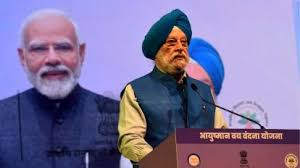Hardeep Singh Puri: ‘Today’s India is different … Pre-Modi era of dealing with Pakistan was a theatre of the absurd’

Union Minister Hardeep Singh Puri recently made a powerful statement, calling India’s past approach to Pakistan “a theatre of the absurd.” He pointed to a clear shift under Prime Minister Narendra Modi, where diplomacy and military strategy now work in sync. His words reflect how India’s foreign policy has changed over the last decade, especially in dealing with cross-border terrorism.
A Harsh View of the Past
Before 2014, India’s response to Pakistan-backed terrorism was often weak and delayed. Puri’s comment about the “theatre of the absurd” echoes the frustration many Indians felt. During attacks like the 2001 Parliament siege or 26/11 in Mumbai, leaders focused more on global pressure and paperwork than action.
Terror groups operated freely in Pakistan, even after evidence linked them to attacks on Indian soil. Governments relied on international condemnation rather than retaliatory strikes, which many viewed as a lack of resolve.
Modi’s India: Clear Red Lines, Stronger Response
Since Narendra Modi took office, India has adopted a tougher and clearer stance. The government has shifted from reactive policies to assertive actions. After the Uri attack in 2016, Indian forces carried out surgical strikes across the border. These operations marked a major shift—India no longer shied away from publicizing its military response.
The Balakot airstrike in 2019, after the Pulwama bombing, sent another strong message. India struck deep inside Pakistan, targeting terror camps. It wasn’t just a military response—it was a strategic signal that India would act, regardless of international caution.
Puri also spoke of “Operation Sindoor,” a recent mission that destroyed terror sites within 22 minutes. The operation showed how India now uses precise intelligence and quick decisions to neutralize threats.
Strategic Timing and Measured Force
Puri praised how India now chooses its actions based on careful judgment, not political pressure. After the Balakot strike, India avoided escalation. It informed the world that its goal was to destroy terror bases, not to attack Pakistan’s military or civilian targets.
This balance of strength and restraint has earned global approval. Countries that once urged India to show restraint now support its right to self-defense. India has shown that it can use force without losing its diplomatic edge.
A Missed Moment in 2008?
Puri questioned why India failed to respond militarily after the 26/11 Mumbai attacks. Even with clear evidence, India didn’t retaliate. Terrorist David Headley later confirmed Pakistan’s role. Yet, the Indian government stayed passive.
According to Puri, the Opposition leader at the time didn’t push for action. He focused on social appearances while the nation mourned. This lack of urgency angered many and widened the gap between public expectations and government response.
Stronger Diplomacy, Not Just Stronger Arms
India’s new strategy extends beyond the battlefield. The government has worked hard to isolate Pakistan diplomatically. It boycotted SAARC meetings, revoked Most Favoured Nation status, and pressured global platforms to recognize Pakistan’s role in terrorism.
These efforts paid off. Pakistan faced growing criticism, even from its long-time allies. Meanwhile, India improved ties with major powers like the U.S., France, and Japan, who increasingly back its stance on terrorism.
A New National Confidence
Puri’s statement also reflects a deeper change. Today’s India believes in its civilizational strength and military capacity. The government projects confidence on all fronts—diplomacy, defense, trade, and culture.
This belief fuels a more assertive foreign policy. India no longer sees itself as a silent regional player. It seeks recognition as a global power, with interests that cannot be ignored.
Conclusion: A Defining Moment in India’s Foreign Policy
Hardeep Singh Puri’s remarks are more than political rhetoric. They highlight a turning point in how India handles national security. Under Modi’s leadership, India has moved from appeasement to assertiveness.
Terrorism now invites retaliation, not reports. Dialogues follow deterrence, not the other way around. For many Indians, this marks a long-awaited shift.
India’s new policy sends a clear message: attacks will have consequences, and national dignity will not be compromised.






